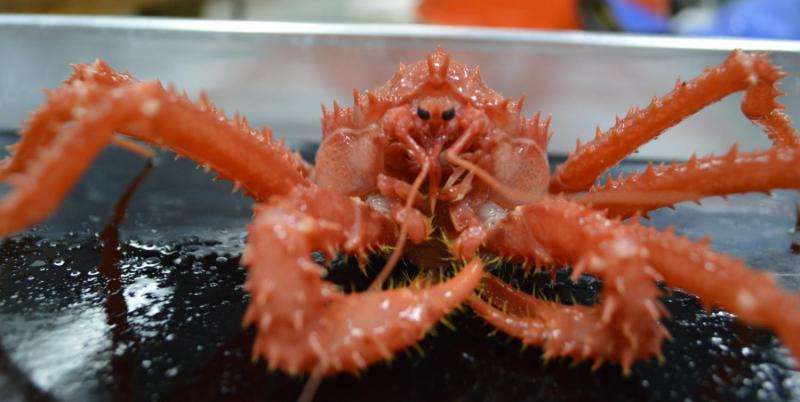King crabs threaten Antarctic ecosystem due to warming ocean

King crabs may soon become high-level predators in Antarctic marine ecosystems where they haven't played a role in tens of millions of years, according to a new study led by Florida Institute of Technology.
"No Barrier to Emergence of Bathyal King Crabs on the Antarctic Shelf," published online in the Proceedings of the National Academy of Sciences, ties the reappearance of these crabs to global warming.
Lead author Richard Aronson, professor and head of Florida Tech's Department of Biological Sciences, said the rising temperature of the ocean west of the Antarctic Peninsula - one of the most rapidly warming places on the planet - should make it possible for king crab populations to move to the shallow continental shelf from their current deep-sea habitat within the next several decades.
Researchers found no barriers, such as salinity levels, types of sediments on the sea floor, or food resources, to prevent the predatory crustaceans from arriving if the water became warm enough.
That arrival would have a huge impact.
"Because other creatures on the continental shelf have evolved without shell-crushing predators, if the crabs moved in they could radically restructure the ecosystem," Aronson said.
The study provides initial data and does not by itself prove that crab populations will expand into shallower waters. "The only way to test the hypothesis that the crabs are expanding their depth-range is to track their movements through long-term monitoring," said James McClintock of the University of Alabama at Birmingham (UAB), another author of the study.
In the 2010-11 Antarctic summer, in research funded by the National Science Foundation (NSF), the team used an underwater camera sled to document a reproductive population of the crabs for the first time on the continental slope off Marguerite Bay on the western Antarctic Peninsula. That area is only a few hundred meters deeper than the continental shelf where the delicate ecosystem flourishes.
The overall effect of the migration of king crabs to shallower waters, explained postdoctoral scientist and study co-author Kathryn Smith of Florida Institute of Technology, would be to make the unique Antarctic ecosystem much more like ecosystems in other areas of the globe, a process ecologists call biotic homogenization.
Such changes, the researchers conclude, would fundamentally alter the Antarctic sea-floor ecosystem and diminish the diversity of marine ecosystems globally.
The data used in the paper were collected during an expedition to Antarctica run jointly by NSF, the Swedish Polar Research Secretariat and the Swedish Research Council. The expedition included scientists from Florida Tech, UAB, the Woods Hole Oceanographic Institution, the University of Gothenburg in Sweden and the University of Southampton in the United Kingdom.
More information: No barrier to emergence of bathyal king crabs on the Antarctic shelf, PNAS, www.pnas.org/cgi/doi/10.1073/pnas.1513962112
Journal information: Proceedings of the National Academy of Sciences
Provided by Florida Institute of Technology



















